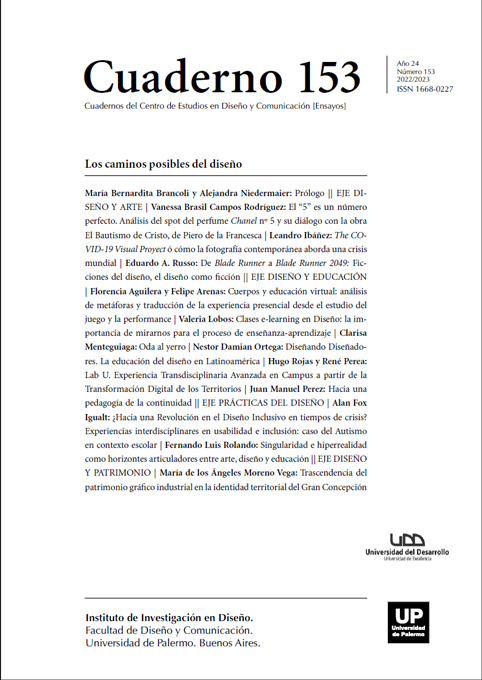Clases e-learning en Diseño: la importancia de mirarnos para el proceso de enseñanza-aprendizaje
Abstract
In 2020 almost overnight, educational institutions all over the world closed their doors due to the Covid-19 pandemic. This unprecedented situation had consequences in the lives of students, teachers and staff of higher education institutions. The closures, as a measure to contain the spread of Covid-19 pandemic, have led to an accelerated deployment of distance education solutions to ensure teaching-learning continuity. The obstacles are multiple, but also the development of new opportunities, especially in higher education in the e-learning modality. Digital technology has had a greater impact in recent decades, designing educational projects based on the premise of distance e-learning education as a means of granting flexibility to the student’s curriculum. This allowed courses in the Design area to use Challenge Based Learning (ABD) as a work methodology to define a challenge and implement a solution. The teachers build the classes together with active and participative students, who with their looks give feedback, dynamism and give life to the class. Following the pulse of learning, teachers provide feedback and get to know the students, what they inquire and require.
References
Cuadrado, I.; Martín-Mora, G. y Fernández, I. (2015). La expresión de las emociones en la Comunicación Virtual: El ciberhabla. Icono 14, volúmen (13), pp. 180-207. doi: 10.7195/ri14.v13i1.716
Edumorfosis, El Corona Teaching, https://edumorfosis.blogspot.com/2020/04/el-coronateaching.html. Consultado el 20 de Abril 2021 Hodges, Ch.; Moore, S.; Lockee, B.; Trust, T. y Bond, A. (2020). The Difference Between Emergency Remote Teaching and Online Learning. Educause review.
IESALC (2015). Instituto Internacional para la Educación Superior en América Latina y el Caribe. COVID-19 y educación superior: De los efectos inmediatos al día después. Análisis de impactos, respuestas políticas y recomendaciones. Universidad del Desarrollo (2016). Proyecto Educativo UDD Futuro.
Los autores/as que publiquen en esta revista ceden los derechos de autor y de publicación a "Cuadernos del Centro de Estudios de Diseño y Comunicación", Aceptando el registro de su trabajo bajo una licencia de atribución de Creative Commons, que permite a terceros utilizar lo publicado siempre que de el crédito pertinente a los autores y a esta revista.


